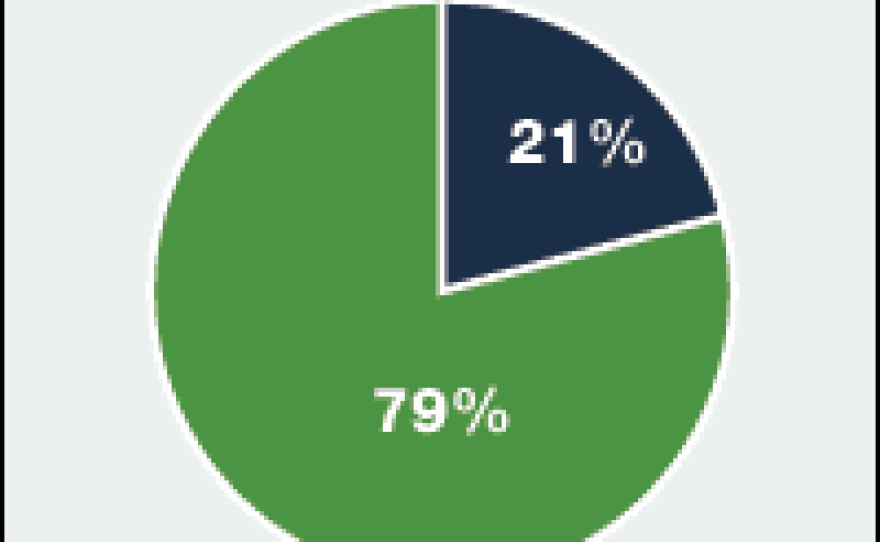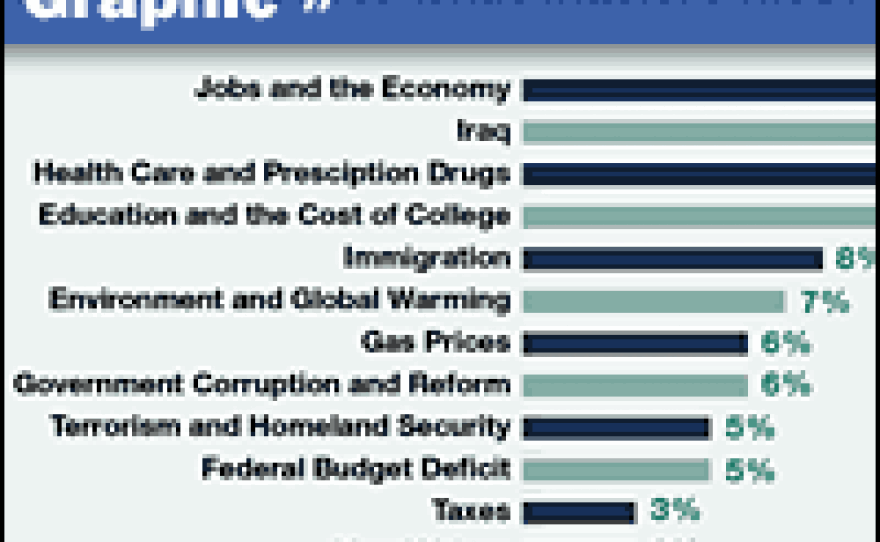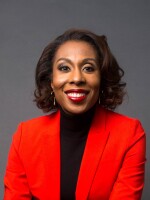

Since the 2000 elections, the number of young Americans going to the polls has increased steadily. This year is no different: In some states, double and triple the number of voters younger than 30 have turned out for primaries, compared with 2006. But another trend is also emerging: the widening voting gap between youth enrolled in college and their non-student peers.
Young voters have been heralded as the new power voting bloc for decades. Presidential campaigns from that of George McGovern to those of Bill Clinton and John Kerry have welcomed their enthusiasm into the fold, with varying degrees of success. This year, exit polls show that Illinois Sen. Barack Obama is the favorite of the under-30 set.
Tiondra Bolden, a 21-year-old student at the University of North Texas, is typical of the hundreds of young people often seen dancing and cheering in the rafters of Obama events. She says Obama speaks to young voters in a way they can relate to.
"It's sort of like, 'Oh! We understand now,' " Bolden says during a recent Obama rally in Dallas.
Bolden says Obama inspires young people to think for themselves, rather than simply following their parents' political choices.
"I can think about what I'm doing when I go to the polls," she says. "I know what they stand for, and [he] makes it more relatable to me."
Activism Strong on Campus
In some areas, colleges and universities have been the centers of support for Obama. Exit polls show that 80 percent of the voters younger than 30 who went to the polls on Super Tuesday attended college.
At schools like the University of Texas in Austin, the election is on everyone's mind, says Cyan Manuel, an economics major.
"Basically, if you walk around the campus, people are alive with politics," Manuel says. "Before, it was kind of dead. A lot of people are getting more interested in politics."
UT Austin hosted the Democratic debate last week, but Manuel wasn't in the audience. She was at the Texas Union Ballroom, across campus, where she watched the debate on a movie theater-size screen, with live music, food and the enthusiasm of a sporting event.
The Non-College Experience
But travel outside of the Austin political bubble, and it's not clear that this enthusiasm is spilling off campus.
John Peterson is a 26-year-old skateboard seller who is volunteering his time at an Obama campaign call center. He finds convincing some of his own friends to be a challenge.
"A lot of them aren't very politically active, and I'm trying to get them down to vote," he says. Many young people who aren't enrolled in college are busy starting careers, he says; they "don't have the time to get out and vote, and they don't want to make the time."
Peterson's friends are more the norm than he is, says Peter Levine of CIRCLE — the Center for Information and Research on Civic Learning and Engagement.
"It's harder to reach young people who have left school," Levine says. "People who are not going to college — they don't congregate as much. They are online somewhat less, and there are fewer institutions to reach them through."
A new study from CIRCLE found that while 1 in 4 eligible college students in Super Tuesday states went to the polls, the numbers were more like 1 in 14 for non-college youth. Levine says unlike in previous generations, non-college youth today are less likely to be involved in unions or social clubs that encourage political engagement.
"You got your civics education in groups like NAACP or Knights of Columbus, but you also got connected to political institutions — so, literally, the candidate would come to the meeting," Levine says. "If you don't congregate with other people, it's much harder for candidates to reach out to you."
Sense of Helplessness Among Non-College Youth
And non-college youth are less likely to believe that their vote matters, according to CIRCLE's research. James Cooper, 25, is a good example. Cooper works at a perfume kiosk at a downtown San Antonio mall. He says he's never been to a political event or had a campaign reach out for his vote.
"I feel like it doesn't matter," Cooper says, adding, "I hear a lot about the last election with Bush and feel like there's no control — I say we have no control."
Although online videos and campaign Web sites are among the major sources of election news for young voters, their friends are their No. 1 source of information. So researchers say the widening class divide between college students and their working peers cannot be ignored. It starts in high school, where there are disparities in civics education, and can carry on into a young adult's working life.
Copyright 2022 NPR. To see more, visit https://www.npr.org. 9(MDAzMjM2NDYzMDEyMzc1Njk5NjAxNzY3OQ001))







